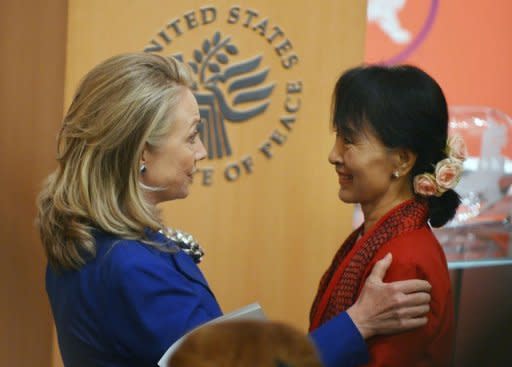Suu Kyi gets historic Washington welcome
Washington rolled out a red-carpet welcome on Wednesday for Myanmar democracy icon Aung San Suu Kyi, who was to hold talks with President Barack Obama and finally receive Congress's highest honor. Obama will meet his fellow Nobel peace laureate for the first time in a private session at the White House at 5:00pm (2100 GMT), which will be closed to the press. The talks come a day after Suu Kyi called for an end to US sanctions on her impoverished country, saying "in the end we have to build our own democracy." The Obama administration has taken pains to ensure the celebration around her visit does not detract from a simultaneous trip to the United States by Myanmar leader Thein Sein, who ushered in reforms much to global surprise. US officials have insisted Thein Sein deserves to be recognized for pushing through such speedy changes in the South East Asian nation, formerly known as Burma, which until last year had been run for half a century by the military. White House spokesman Jay Carney said Obama was looking forward to his meeting with Suu Kyi as "it provides another opportunity to reaffirm our long-standing support for her struggle and the struggle of many others towards democratic, just and transparent governance in Burma." Freed in 2010 after 15 years of under house arrest, Suu Kyi has received a rapturous welcome on her first visit to Washington since her release. She was to receive the US Congress' highest honor, the Congressional Gold Medal, which she was awarded in 2008 during her confinement. On Tuesday in her first public appearance of an 18-day trip, Suu Kyi thanked the United States for its support but said reforms must proceed without the pressure of sanctions. "I do not think that we need to cling onto sanctions unnecessarily because I want our people to be responsible for their own destiny and not to depend too much on external props," Suu Kyi said, in a speech at the Asia Society. Careful to avoid antagonizing Myanmar leaders, she also insisted improved relations with Washington would not pose a threat to Myanmar's ties with China. The opposition leader had long supported economic sanctions to pressure her jailers, Myanmar's junta, and her change of view will probably be taken seriously in Washington. The United States began rolling back restrictions in July, opening Myanmar up to US investment despite Suu Kyi's earlier unease about US firms doing business with the state-owned oil and gas company. "There are very many other ways in which the United States can help us to achieve our democratic ends and help us to build up the kind of democratic institutions that we are in such need of," Suu Kyi said. "Sanctions are not the only way," she added. Suu Kyi, now a member of parliament, said she believes President Thein Sein is "keen" on change but said the judiciary -- and not the executive -- was the "weakest arm" of the reform. "We have passed a first hurdle, but there are many more hurdles to cross," she said. On the eve of Suu Kyi's trip, her party said that authorities freed another 87 political prisoners in what analysts saw as a new gesture by Thein Sein ahead of his arrival in the United States next week. Many US observers believe Thein Sein launched the reforms out of concern over Beijing's overwhelming political and economic dominance in Myanmar. Suu Kyi began her visit Tuesday by meeting Secretary of State Hillary Clinton, who marveled at her political odyssey, saying Myanmar was opening up to the world in ways that would have been difficult to imagine even recently." But Clinton warned Myanmar still had "a lot of work" to do, including freeing remaining political prisoners and ending alleged military contacts with North Korea, and warned against "backsliding." "The government and the opposition need to continue to work together to unite the country, heal the wounds of the past and carry the reforms forward," said Clinton, who paid a landmark visit to Myanmar in December. Clinton also called for Myanmar to address tensions in Rakhine state, where recent violence between majority Buddhists and the Muslim Rohingya minority left scores dead and displaced tens of thousands of people. Suu Kyi has come in for rare criticism from human rights activists, who have pressed her to speak out on behalf of the 800,000-strong Rohingya population.



